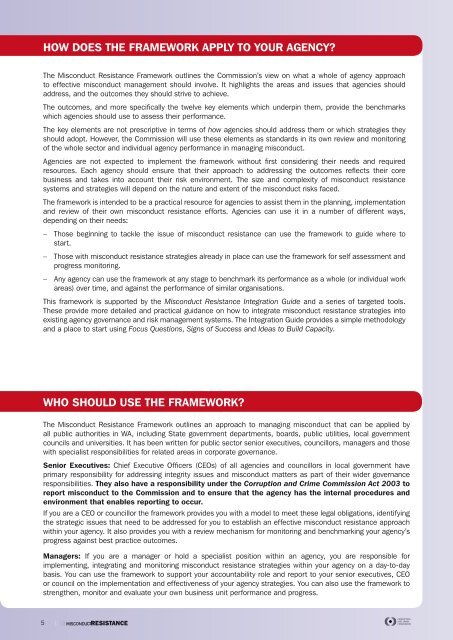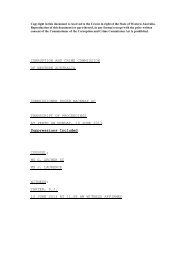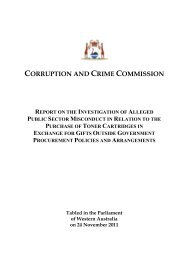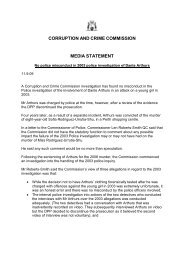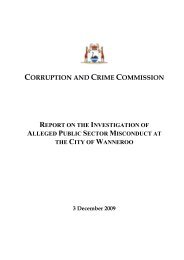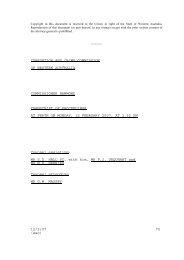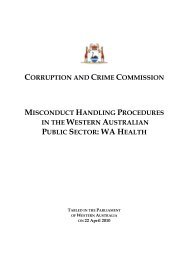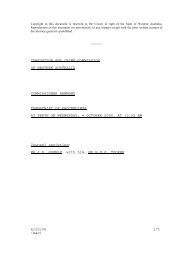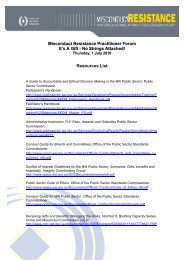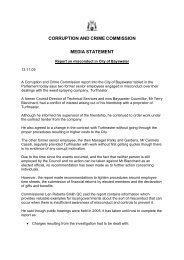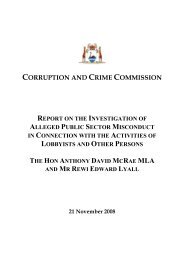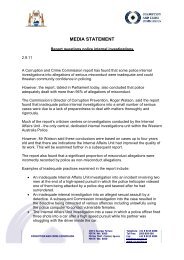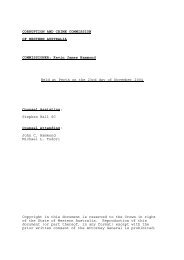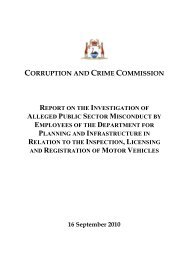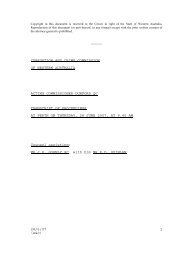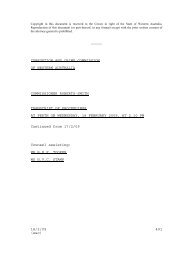Misconduct Resistance Framework - Corruption and Crime ...
Misconduct Resistance Framework - Corruption and Crime ...
Misconduct Resistance Framework - Corruption and Crime ...
You also want an ePaper? Increase the reach of your titles
YUMPU automatically turns print PDFs into web optimized ePapers that Google loves.
HOW DOES THE FRAMEWORK APPLY TO YOUR AGENCY?<br />
The <strong>Misconduct</strong> <strong>Resistance</strong> <strong>Framework</strong> outlines the Commission’s view on what a whole of agency approach<br />
to effective misconduct management should involve. It highlights the areas <strong>and</strong> issues that agencies should<br />
address, <strong>and</strong> the outcomes they should strive to achieve.<br />
The outcomes, <strong>and</strong> more specifically the twelve key elements which underpin them, provide the benchmarks<br />
which agencies should use to assess their performance.<br />
The key elements are not prescriptive in terms of how agencies should address them or which strategies they<br />
should adopt. However, the Commission will use these elements as st<strong>and</strong>ards in its own review <strong>and</strong> monitoring<br />
of the whole sector <strong>and</strong> individual agency performance in managing misconduct.<br />
Agencies are not expected to implement the framework without first considering their needs <strong>and</strong> required<br />
resources. Each agency should ensure that their approach to addressing the outcomes reflects their core<br />
business <strong>and</strong> takes into account their risk environment. The size <strong>and</strong> complexity of misconduct resistance<br />
systems <strong>and</strong> strategies will depend on the nature <strong>and</strong> extent of the misconduct risks faced.<br />
The framework is intended to be a practical resource for agencies to assist them in the planning, implementation<br />
<strong>and</strong> review of their own misconduct resistance efforts. Agencies can use it in a number of different ways,<br />
depending on their needs:<br />
– Those beginning to tackle the issue of misconduct resistance can use the framework to guide where to<br />
start.<br />
– Those with misconduct resistance strategies already in place can use the framework for self assessment <strong>and</strong><br />
progress monitoring.<br />
– Any agency can use the framework at any stage to benchmark its performance as a whole (or individual work<br />
areas) over time, <strong>and</strong> against the performance of similar organisations.<br />
This framework is supported by the <strong>Misconduct</strong> <strong>Resistance</strong> Integration Guide <strong>and</strong> a series of targeted tools.<br />
These provide more detailed <strong>and</strong> practical guidance on how to integrate misconduct resistance strategies into<br />
existing agency governance <strong>and</strong> risk management systems. The Integration Guide provides a simple methodology<br />
<strong>and</strong> a place to start using Focus Questions, Signs of Success <strong>and</strong> Ideas to Build Capacity.<br />
WHO SHOULD USE THE FRAMEWORK?<br />
The <strong>Misconduct</strong> <strong>Resistance</strong> <strong>Framework</strong> outlines an approach to managing misconduct that can be applied by<br />
all public authorities in WA, including State government departments, boards, public utilities, local government<br />
councils <strong>and</strong> universities. It has been written for public sector senior executives, councillors, managers <strong>and</strong> those<br />
with specialist responsibilities for related areas in corporate governance.<br />
Senior Executives: Chief Executive Officers (CEOs) of all agencies <strong>and</strong> councillors in local government have<br />
primary responsibility for addressing integrity issues <strong>and</strong> misconduct matters as part of their wider governance<br />
responsibilities. They also have a responsibility under the <strong>Corruption</strong> <strong>and</strong> <strong>Crime</strong> Commission Act 2003 to<br />
report misconduct to the Commission <strong>and</strong> to ensure that the agency has the internal procedures <strong>and</strong><br />
environment that enables reporting to occur.<br />
If you are a CEO or councillor the framework provides you with a model to meet these legal obligations, identifying<br />
the strategic issues that need to be addressed for you to establish an effective misconduct resistance approach<br />
within your agency. It also provides you with a review mechanism for monitoring <strong>and</strong> benchmarking your agency’s<br />
progress against best practice outcomes.<br />
Managers: If you are a manager or hold a specialist position within an agency, you are responsible for<br />
implementing, integrating <strong>and</strong> monitoring misconduct resistance strategies within your agency on a day-to-day<br />
basis. You can use the framework to support your accountability role <strong>and</strong> report to your senior executives, CEO<br />
or council on the implementation <strong>and</strong> effectiveness of your agency strategies. You can also use the framework to<br />
strengthen, monitor <strong>and</strong> evaluate your own business unit performance <strong>and</strong> progress.<br />
5


